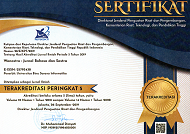The Investigation of Politeness Principles and Strategies Used in Akeelah and the Bee Movie
Abstract
This research was aimed to investigate what kind of politeness principle and most dominant type applied in the utterances of the main characters’ Akeelah and the Bee movie and strategies applied in their utterances of the main characters’ Akeelah and the Bee movie. A descriptive qualitative was employed in this research. It concerned with the description of the data in the form of utterances produced by the characters in which politeness principles and strategies exist. There were two sources in this research. The primary source was the script of the movie. The secondary sources were books. The results of this research were: first, the main characters applied agreement maxim, approbation maxim, tact maxim, modesty maxim, and sympathy maxim in their utterances and the most dominant type used is agreement maxim. Second, in the application of politeness strategies, the main characters applied Bald-on-record, positive politeness, negative politeness, and off-record in their utterances.
Keywords: Akeelah and the Bee, politeness principles, politeness strategies.
Full Text:
PDFReferences
Allami, H. & Naeimi, A. (2011). A cross-linguistic study of refusals: An analysis of pragmatic competence development in Iranian EFL learners. Journal of Pragmatics, 43, 385-406.https://doi.org/10.1016/j.pragma.2010.07.010
Brown, P., & Levinson, S. C. (1988). Politeness: Some Universals in Language Usage. In Interactional Sociolinguistic.
Creswell, J. W. (2012). Educational Research: Planning, conducting, and evaluating quantitative and qualitative research (C. Robb (ed.); 4th ed.). PEARSON. http://library1.nida.ac.th/termpaper6/sd/2554/19755.pdf
Denzin, N. K., & Lincoln, Y.S. (2005). The handbook of qualitative research (2nd ed.). London: Sage Publisher
F Hawa, R Sukmaningrum. 2011. The Level of Directness in Apologising in Akeelah and the Bee Movie Dialogue. ETERNAL (English Teaching Journal), 103.98.176.9/index.php/eternal/article/download/449/405
Johnson, D. M., Yang, A. W., Brown, P., & Levinson, S. C. (1988). Politeness: Some Universals in Language Usage (Studies in Interactional Sociolinguistics 4). TESOL Quarterly. https://doi.org/10.2307/3587263
Johnston, Scott W., V. D. D. (2011). Research method in everyday life. In Methods in molecular biology (Clifton, N.J.).
Lakoff, R. T. (1973). The logic of politeness; or, minding your p’s and q’s. In Papers from the ninth regional meeting of the Chicago Linguistic Society.
Lakoff, R. T., & Ide, S. (2005). Intruduction: Broadening the horizon of linguistic politeness. In Pragmatics & Beyond New Series.
Leech, G. (2014). The Pragmatics of Politeness. In The Pragmatics of Politeness. https://doi.org/10.1093/acprof:oso/9780195341386.001.0001
Leech, G. (2016). Principles of Pragmatics. In Principles of Pragmatics. https://doi.org/10.4324/9781315835976
Levinson, Stephen C. 1983. Pragmatics. London: Longman.
Moleong, L. J. (2017). Metodologi Penelitian Kualitatif (Edisi Revisi). In PT. Remaja Rosda Karya.
Mu, Yuting. 2015. The Application of Politeness Strategies in English and Chinese Movie Reviews. International Journal of English Linguistics. Vol (5) 6. doi:10.5539/ijel.v5n6p105
Mulyono, Eko. 2016. Politeness Principle Analysis in Cartoon Movie Entitled Stand by Me Doraemon. Premise Journal. Vol (5) 1
Rahayu, N. S. (2018). Refusal strategy performed by Indonesian EFL learners. Indonesian EFL Journal, 5(1), 67-76. doi: 10.25134/ieflj.v5i1.1612.
Rosari, Miwita. 2016. Politeness Strategies Applied by the Characters of The Great Debaters Movie LLT Journal: A Journal on Language and Language Teaching. Vol (19) 1. DOI: https://doi.org/10.24071/llt.2016.190103
Sukma, B.P., Utomo, D.W. 2016. Interpersonal Metadiscourse In The Jakarta Post E-News Opinion Articles. Jurnal BEBASAN Jurnal Ilmiah Kebahasaan dan Kesastraan. Vol 3(1). 17-27
Violen Winerta, Hamzah, Rima Andriani Sari. 2012. An Analysis of Politeness Strategies in Requesting Used in Real Human and Non-Human Conversation On “Avatar” Movie. E-Journal English Language and Literature, 1(1) 1-12.
Watts, Richard J. (2003). Politeness. Cambridge University Press.
Yang, L., & Wanaruk, A. (2018). A cross-cultural pragmatic study of the speech act of complaining. Kasetsart Journal of Social Sciences, xxx, 1-7.
Yule, G. (2005). The study of language (3rd ed.). Cambridge University Press.
DOI: https://doi.org/10.31294/w.v13i1.9690
Copyright (c) 2021 Esa Nur Hikmahwati, Dhafid Wahyu Utomo, Sutrisno Sadji Evenddy

This work is licensed under a Creative Commons Attribution-ShareAlike 4.0 International License.
Index by:
Published by Department of Research and Community Service (LPPM) Universitas Bina Sarana Informatika by supported Relawan Jurnal Indonesia
Jl. Kramat Raya No.98, Kwitang, Kec. Senen, Jakarta Pusat, DKI Jakarta 10450

This work is licensed under a Creative Commons Attribution-ShareAlike 4.0 International License







